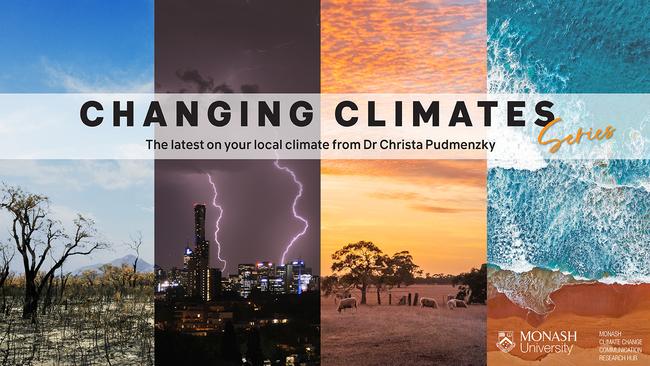Report reveals household gas use poses serious health risks
Monash University report warns household gas use is hurting our health. Author of Changing Climates series Dr Christa Pudmenzky breaks down the research.

Hyperlocal
Don't miss out on the headlines from Hyperlocal. Followed categories will be added to My News.
From frying eggs on a lazy Sunday morning to heating our homes during a chilly winter, Australians have long relied on gas for many of life's daily activities.
Recent data shows coal, oil and gas collectively account for 91 per cent of our primary energy sources.
Despite its widespread use, there is growing evidence that household gas poses serious concerns for our health.
According to the Monash Climate Change Communication Research Hub's 2023 report 'Switching On', air pollution is a big factor, with gas stoves and unflued gas heaters as the main culprits.
Dangerous pollutants released during the combustion of gas include fine particulate matter, nitrogen dioxide, carbon monoxide, and formaldehyde.
Carbon monoxide is often associated with much larger scary tales of gas leaks and explosions.
However, many are unaware that in small concentrations, it can reduce the oxygen-carrying capacity of blood, which can affect brain function even at low levels under long-term exposure.
A lesser known pollutant is fine particulate matter.
Given their small size, these particles can travel deep into the respiratory system, and are associated with type two diabetes, lung disease, and preterm birth rates.
Household pollutants are dangerous for everyone, however some groups are disproportionately affected, including children, those with pre-existing respiratory conditions, lower income households and people of colour.
For example, a report found up to 12 per cent of asthma in children under 14 years can be attributed to gas use in the home.
According to the report, this is comparable to the asthma risk for children living in a household with passive smoking.
Not only that, nitrogen dioxide is associated with increased severity of asthma symptoms in children, including the frequency of wheezing and dependency on ventolin.
There are a number of ways we can reduce the risks posed by household gas.
Using an extractor fan, range hood and opening windows when cooking are simple but effective ways to expel nasty pollutants.
Purchasing an air purifier or a portable induction stove top are also good options.
However, while useful, these are temporary fixes to a much bigger problem.
Removing our reliance on gas won't just protect our health, but the planet's as well.

Gas use and climate change
The burning of fossil fuels for energy is one of the key drivers of rising greenhouse gas emissions, and with this comes a whole host of consequences including the increased frequency and intensity of extreme weather, and accelerated extinction rates and sea-level rise.
In order to limit these far reaching impacts, the United Nations have stated that a swift transition away from fossil fuels is critical.
To achieve this, most countries including Australia have pledged to limit global warming within 1.5C of pre-industrial levels, and to reach net-zero emission by 2050.
While it's no mean feat, transitioning to renewable sources of energy will bring this within reach.
Major industries including agriculture, transport and aviation will all need to embrace the transition, and we can get on board by making the switch at home.
Benefits of making the switch
Household electrification can keep both our homes and our wallets healthy.
Induction cooktops offer a safe and pollutant free kitchen to help you breathe easy.
They also boil water almost twice as fast as their fiery gas competitors, saving you time cooking up family feasts.
Using a split system for heating up or cooling down indoor temperatures, helps to fight off those winter colds or sweating through a summer scorcher.
Together, utilising these technologies can not only protect our health by limiting air pollution, they also help our planet and our back pocket.
In fact, a complete electrification of our residential sector would save us a whopping 4.9 billion dollars.
On average, Queensland residents could save an average of $1233 per year by electrifying their cooking, heating and hot water systems.

Not only that, with the current cost of living crisis, gas is becoming increasingly more expensive to use, with prices rising 6.4 per cent per annum since 2012, compared to electricity at 3.8 per cent.
Electric options are also more energy efficient, meaning household tasks like cooking take less energy, which can help lower our bills.
Considering all the potential benefits, many Aussies are already making the switch, however, upfront costs can be a big barrier for families, and renters often don't have the choice.
To address this, government support through justice-focused policies are needed to improve access to these options.
Whether you're cooking up a family dinner, or fighting over the bathroom in a sharehouse, having a safe home free of pollutants is key during all of life's stages.
In this Changing Climates series, we will explore the potential job opportunities and policy gaps of household electrification in the weeks to come, so be sure to check out the latest fortnightly instalment.
Want more information on how your climate is changing? Check out the last article in this series.
Dr Christa Pudmenzky is a climate scientist at the University of Southern Queensland.
This column is part of a collaboration between Monash University and News Corp to deliver hyperlocal weather and climate information.


